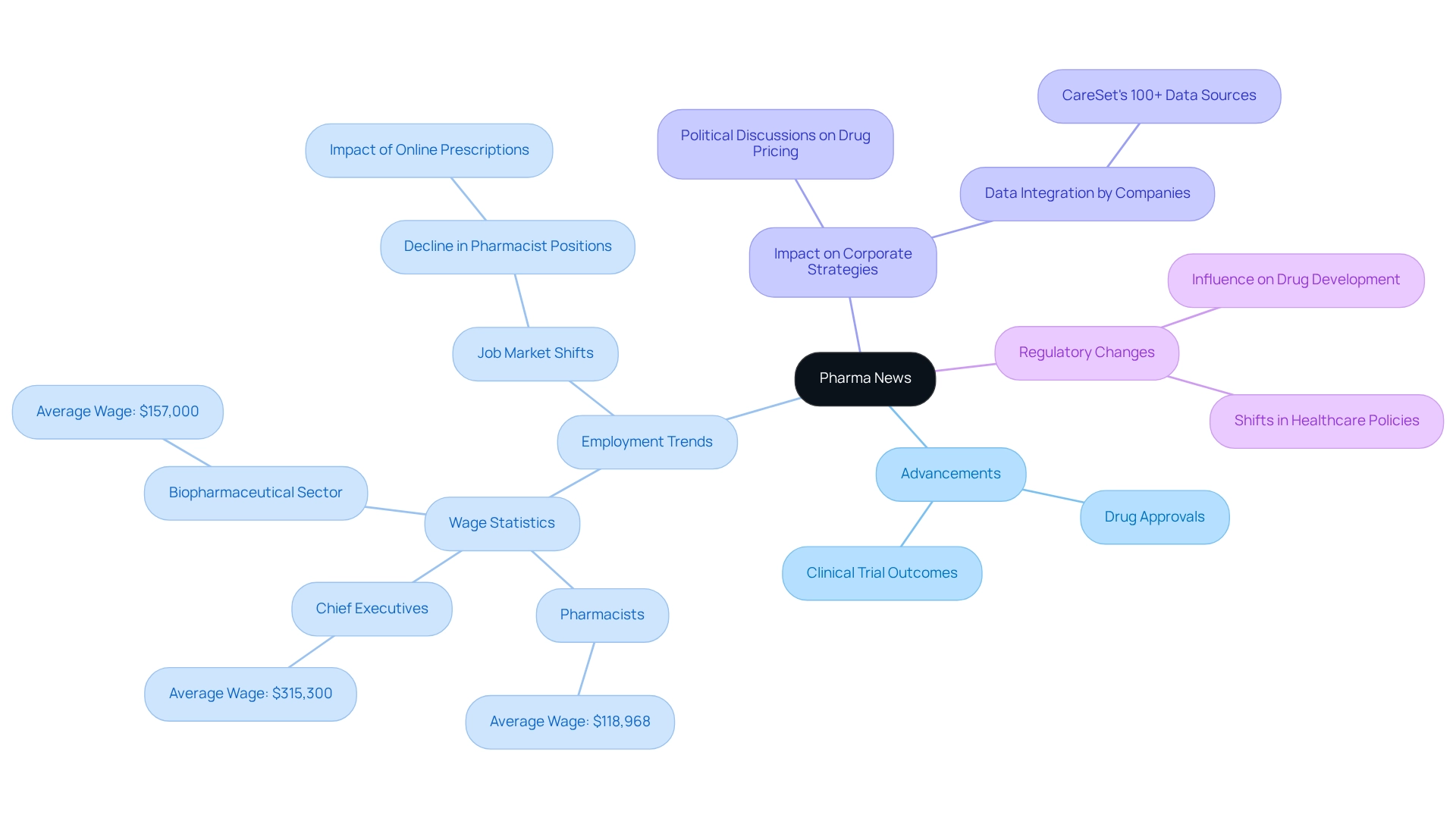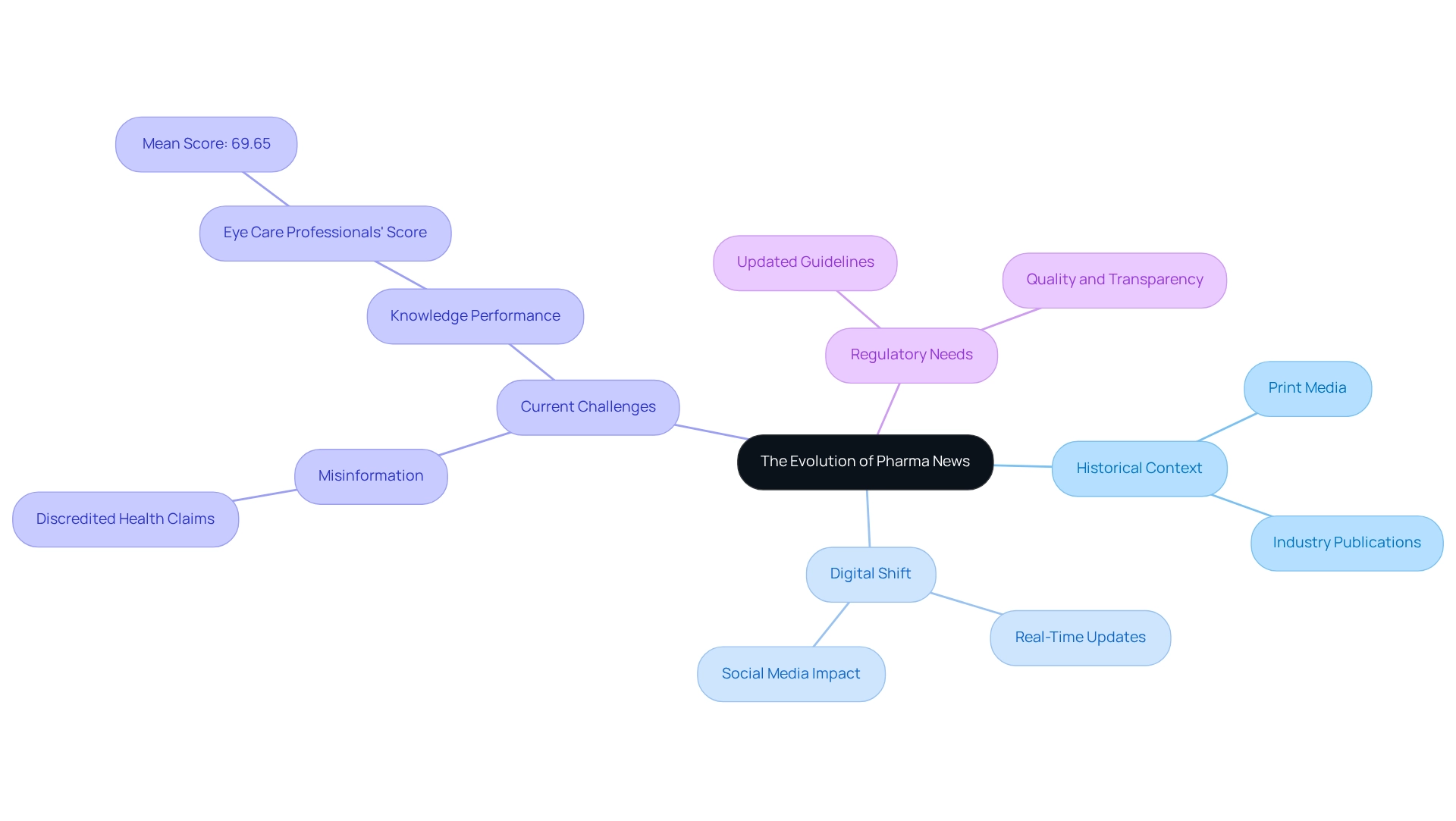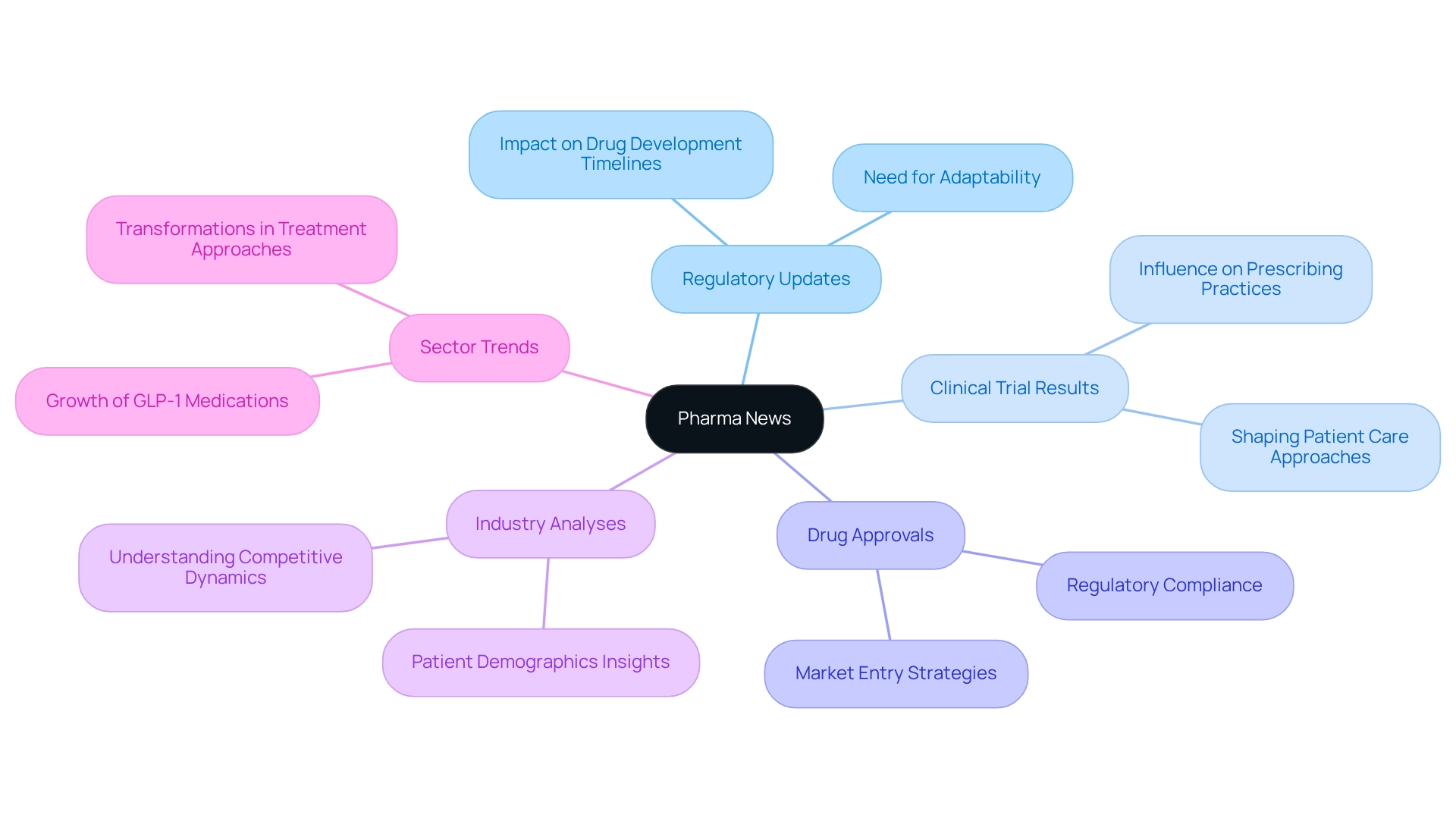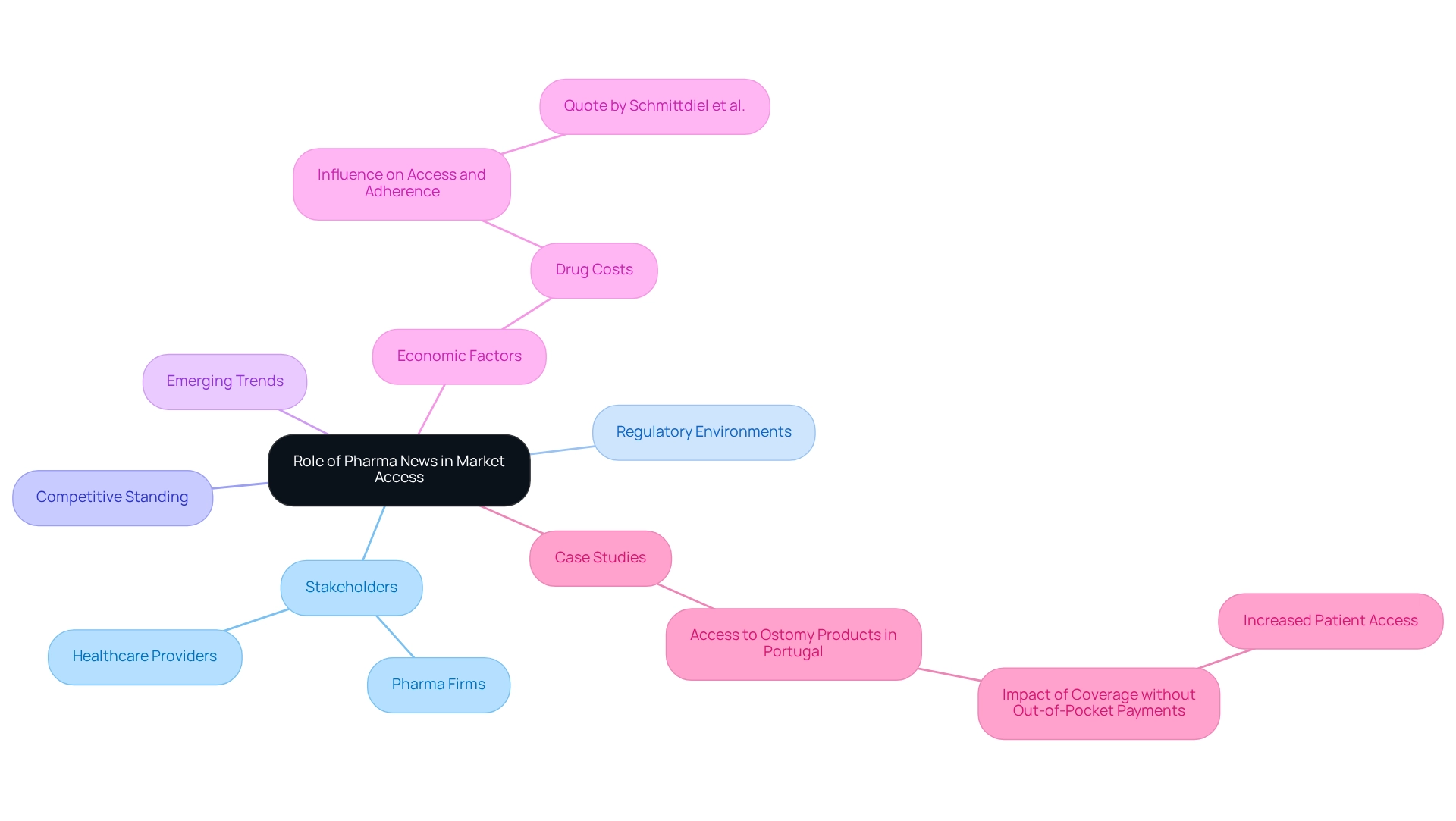Overview
The article underscores the critical role of pharma news in the drug industry, emphasizing its importance in keeping stakeholders informed about:
- Drug approvals
- Clinical trial outcomes
- Regulatory changes
This significance is further highlighted by the essential need for pharmaceutical companies to adapt to evolving market dynamics and healthcare policies. Such adaptability is crucial for effective decision-making and strategic planning in drug development and market access. By staying informed, stakeholders can navigate the complexities of the industry with confidence, ensuring they remain competitive in a rapidly changing environment.
Introduction
In the rapidly evolving landscape of the pharmaceutical industry, the significance of staying informed through pharma news cannot be overstated. This news encompasses a wide array of developments, from drug approvals to regulatory changes, all of which play a crucial role in shaping corporate strategies and influencing public health policies.
As stakeholders strive to navigate the complexities of drug development and market access, the insights gleaned from timely updates become invaluable. With the integration of advanced data analytics and comprehensive market insights, companies are better positioned to respond to emerging challenges and opportunities, ensuring they remain competitive in a dynamic environment.
As the industry faces ongoing shifts—particularly in the context of drug pricing discussions—understanding the impact of pharma news on strategic decision-making will be vital for fostering innovation and enhancing patient care.
Defining Pharma News: Scope and Importance in the Industry
Pharma news includes the latest advancements, trends, and insights within the drug industry, addressing drug approvals, clinical trial outcomes, regulatory changes, and industry dynamics. This resource is essential for stakeholders, enabling them to stay informed about innovations, competitive strategies, and shifts in healthcare policies.
In 2025, the relevance of these updates is underscored by ongoing political debates surrounding drug pricing, which are expected to significantly influence corporate strategies and public health policies, highlighting the importance of staying informed about pharma news for drug companies to navigate the complexities of drug development and market entry.
For example, the average annual wage in the pharmaceutical sector is considerably higher than in many other industries, with pharmacists earning approximately $118,968 and Chief Executives earning upwards of $315,300. This lucrative job market reflects the sector’s growth and the critical need for informed decision-making driven by current information.
However, it is important to note that pharmacist positions are experiencing a slight decline due to the rise of online and mail-order prescriptions, indicating a shift in the employment landscape.
Furthermore, the integration of over 100 external data sources by firms like CareSet highlights the necessity of comprehensive insights in understanding treatment trends and industry dynamics. CareSet’s Medicare data solutions provide healthcare stakeholders with actionable insights derived from the experiences of over 62 million beneficiaries and 6 million providers.
As the landscape evolves, pharma news highlights the impact of pharmaceutical updates on drug approvals and access, shaping the strategies of pharmaceutical companies. The ability to analyze and comprehend this data is crucial for firms aiming to maintain a competitive edge, with expert insights showing that pharma news not only keeps stakeholders informed about ongoing trends but also plays a pivotal role in drug development processes.
By examining the latest insights, companies can better position themselves to address emerging challenges and seize opportunities, ultimately enhancing their market reach and patient engagement.

The Evolution of Pharma News: Historical Context and Development
The evolution of drug-related updates can be traced back to the origins of the medicine sector, where information was primarily disseminated through print media and industry publications. As the industry grew, the complexity of the information increased, necessitating more sophisticated communication methods. The advent of the internet marked a pivotal shift in this landscape, enabling real-time updates and broader access to critical information. Today, the timely delivery of pharma news is integral, with digital platforms, social media, and specialized information outlets reflecting the industry’s dynamic nature and the growing demand for transparency and accountability.
Statistics reveal that the mean overall knowledge performance score among eye care professionals in Nepal stands at 69.65%. This statistic highlights the importance of accurate information dissemination in healthcare. While professionals demonstrate a reasonable level of knowledge, there remains significant potential for enhancement, particularly in light of evolving industry news. Additionally, the persistence of discredited health claims underscores the challenges in combating misinformation, which impacts not only healthcare workers but also the general public. The reality that healthcare professionals are just as susceptible to health misinformation as individuals in various job sectors emphasizes the critical need for trustworthy information sources within the drug industry.
As drug promotion evolves in the digital era, there is an urgent demand for revised regulatory and ethical standards to ensure the quality and clarity of information. A recent review advocates for policies that enhance information quality and safeguard public health, illustrating the changing dynamics of consumer engagement with drug marketing. This evolution necessitates continuous adaptation of strategies to effectively navigate the complexities of pharma news dissemination in an increasingly digital world. CareSet’s extensive Medicare data insights can empower drug and biotech firms to make data-informed decisions, ensuring they remain at the forefront of industry advancements. As noted by Dyer C., the retraction of Wakefield’s MMR paper serves as a stark reminder of the consequences of misinformation, reinforcing the necessity of maintaining high standards in pharmaceutical communication.

Key Components of Pharma News: Types and Their Impact on Stakeholders
Pharma news includes several essential elements, such as regulatory updates, clinical trial results, drug approvals, industry analyses, and sector trends. Regulatory updates are crucial, informing stakeholders about changes in laws and guidelines that directly impact drug development and market entry. The latest regulatory updates in 2025 underscore the need for adaptability and agility within the industry to mitigate disruptions in drug development timelines, emphasizing the importance of staying informed to effectively navigate these changes.
Clinical trial results are pivotal, providing insights into the efficacy and safety of new treatments. These results not only influence prescribing practices but also shape patient care approaches. Real-world examples illustrate how favorable clinical trial outcomes can lead to increased confidence and strategic shifts in promotional methods.
Industry analyses equip firms with a comprehensive understanding of competitive dynamics and patient demographics, enabling informed strategic choices. The expansion of GLP-1 medications, for instance, is driving significant transformations in diabetes and obesity treatment, showcasing how pharma news can reshape therapeutic approaches and influence business strategies. Each category of pharmaceutical news plays a vital role in shaping the actions and strategies of stakeholders within the healthcare ecosystem. Statistics indicate that timely access to this information can significantly enhance decision-making processes, ultimately resulting in improved patient outcomes.
CareSet’s commitment to data leadership is exemplified through its innovative data science products, which encompass advanced analytics tools and real-time data integration capabilities. These products empower pharmaceutical and biotech companies with comprehensive Medicare data insights from over 62 million beneficiaries and 6 million providers. This capability not only enhances patient care but also fosters long-term strategic development for partners in the healthcare sector, ensuring they remain competitive and adaptable to evolving industry conditions. CareSet’s recent product announcements further underscore its dedication to delivering actionable insights that drive success in drug launch plans.

The Role of Pharma News in Market Access and Strategic Decision-Making
Pharma news is vital for entry into the pharmaceutical industry, equipping stakeholders with essential information to navigate regulatory environments, assess competitive standing, and identify emerging trends. For pharmaceutical firms, staying informed about the latest advancements is crucial for developing effective market access plans that align with current regulations and market demands. Healthcare providers also depend on pharma news to make informed decisions regarding treatment options and patient engagement initiatives. The influence of pharma news on strategic decision-making underscores the necessity of considering economic factors in medication access plans. As noted by Schmittdiel et al., ‘The cost of drugs can influence access and medication adherence,’ highlighting the imperative for drug companies to factor economic elements into their strategies. CareSet’s comprehensive Medicare data solutions, which encompass insights from over 62 million beneficiaries and 6 million providers, empower stakeholders to effectively understand patient needs and pharmaceutical utilization. This data-driven approach is essential for enhancing healthcare provider involvement and refining treatment plans.
A compelling case study is the observational study on access to ostomy products in Portugal, which revealed that offering coverage without out-of-pocket payments significantly improved patient access. This illustrates how timely pharma news can lead to strategic initiatives that enhance patient care, highlighting the direct impact of pharmaceutical updates on such outcomes. As we advance toward 2025, pharma news will continue to evolve, shaping healthcare provider decision-making and influencing the landscape of pharmaceutical strategies. By leveraging insights from CareSet’s Medicare data and pharma news, stakeholders can refine their strategic decision-making processes, ultimately resulting in improved patient outcomes and more effective healthcare delivery. Expert opinions indicate that remaining informed about emerging trends will be critical for navigating the complexities of the healthcare environment in the years ahead.

Conclusion
Staying informed through pharma news is not just beneficial; it is essential for all stakeholders within the pharmaceutical industry. This news encompasses a broad spectrum of developments, including drug approvals, regulatory updates, and market dynamics, all crucial for informed decision-making. As the industry faces challenges such as evolving drug pricing discussions and the complexities of market access, harnessing timely information becomes a significant competitive advantage.
The evolution of pharma news, from traditional print to modern digital platforms, emphasizes the growing demand for real-time updates and reliable information. This transition is critical for countering misinformation that can affect both healthcare professionals and the public. Furthermore, the integration of comprehensive data analytics, as exemplified by CareSet’s innovative solutions, underscores the importance of leveraging insights to enhance patient care and drive strategic growth in an increasingly competitive landscape.
Ultimately, the impact of pharma news on market access and strategic decision-making cannot be overstated. It equips pharmaceutical companies and healthcare providers with the knowledge needed to navigate regulatory landscapes, assess competitive positioning, and respond effectively to emerging trends. As the industry progresses into 2025 and beyond, the continuous adaptation to new information will be vital for fostering innovation, improving patient outcomes, and ensuring that stakeholders remain agile and responsive to the ever-changing healthcare environment. Embracing this dynamic landscape will not only enhance corporate strategies but also contribute to better healthcare delivery for patients worldwide.

